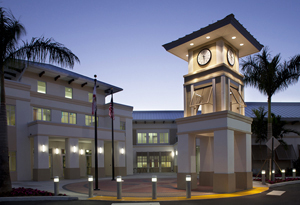On Wednesday, Oct. 13, Wellington’s Planning, Zoning & Adjustment Board discussed the use of artificial turf in place of grass in commercial and residential areas where grass does not seem to grow well.
Senior Planner Damian Newell said that artificial turf is being requested more frequently in the village and provided information on the pros and cons of its use.
Current regulations limit the installation of artificial turf to governmental use, Newell said, but the village has seen an increase in the use of artificial turf on residential lots and within commercial centers. On Sept. 28, the Wellington Village Council approved a zoning-in-progress moratorium on processing applications for the installation of artificial turf for 180 days to allow time for research and to draft code enforcement regulations.
Newell said that the newer artificial turf is less abrasive and less toxic than previous versions and looks more like natural grass. The newer turf is also more durable, especially in areas where natural grass tends to wear down.
The disadvantages are that the artificial turf does increase the temperature in the area that it is used. “Compared to natural grass, it’s shown to be 40 degrees Fahrenheit higher,” Newell said.
Artificial turf also leads to an increase in stormwater runoff, increasing the potential of flooding.
“Much of it has to do with how it’s installed,” Newell said. “It also has some water quality concerns. It is made of synthetic material and that does give off some toxic elements, especially when it’s in the sun.”
He said there are no ecosystem benefits and there is a loss of water retention, water recharge capability, oxygen generation and wildlife benefit.
“It doesn’t benefit them in any way,” Newell said, adding that a potential user should look to the latest generations of artificial turf, which generate fewer toxins. There is a potential for odor buildup, especially for residences with animals, necessitating regular maintenance.
Because it is considered a hard surface, there is a potential for additional noise in the space, he said, adding that the ordinance is designed primarily for zero-lot line homes with smaller backyards and side space, where grass might not grow well.
The packet prepared by village staff proposes limited use on residential and commercial property. The permitted residential use would be for rear and side yards only, not in the front yard or areas visible from the road. It would also be permitted in residential playgrounds and common areas. There is also a provision requiring canopy landscaping over open areas to reduce sunlight on the artificial turf.
“For commercial areas, it is typically not allowed in the landscape buffers or areas that are visible from the right of way,” Newell said. “We are trying to figure out the best options.”
PZA Board Member Adam Rabin asked if the ordinance would apply within communities governed by homeowners’ associations, and Planning & Zoning Manager Cori Lyn Cramer said it would apply, but HOAs could enact uses that are more restrictive, but not less than the limitations of the village ordinance.
Rabin also asked if artificial turf has been allowed in other municipalities.
Newell said that West Palm Beach considered a proposed ordinance and rejected it, adding that there are other locations that have different restrictions based on the material and locations. Staff also reached out for feedback on the use of artificial turf and has not received much negative comment.
“The main problem is that if it is not installed correctly or if the material that they are using does not last a long period of time,” he said.
Rabin asked if there will be building inspections when it is installed, and Newell said part of the application requires a pre-inspection for drainage and installation.
PZA Board Member Jeffrey Robbert asked staff if they had looked at suppliers, and Newell said that based on local standards, the fourth-generation products are best, adding that a United States manufacturer and warrantee are required. Cramer added that suppliers must provide information on what their product is made of, and staff has developed standards it can enforce.
PZA Board Member Maureen Martinez asked how the proposed ordinance came about, and staff explained that a local shopping center had used artificial turf in some of its open areas. Subsequently, the moratorium was put in place until a policy can be developed.
No decision was made at the meeting, since the discussion was in workshop form, but several board members said they liked the concept. It will come back to the board for a recommendation on Wednesday, Nov. 10.








